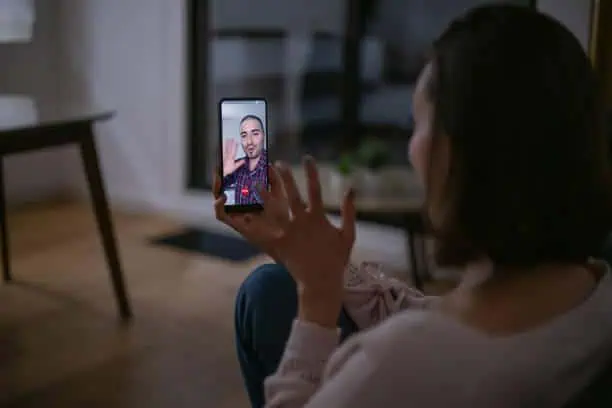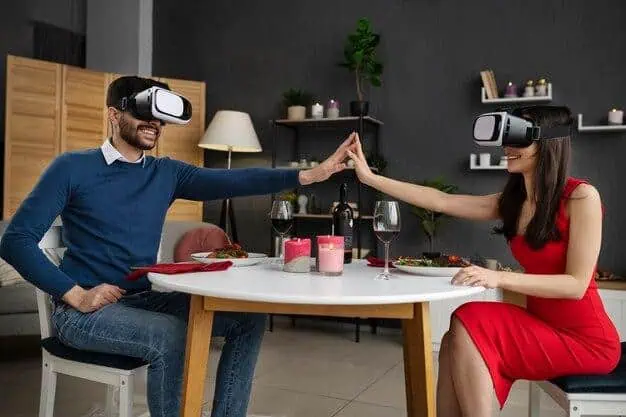
Social Media and Relationships
Navigating the complex Influences of social media and relationships; Can social media fortify the bonds we share, or does it insidiously undermine them? As you delve into the impact of social media on relationships, this article, enriched with Coach Brad’s expert perspective, offers concrete insights into how digital connectivity influences our romantic lives. Coach Brad, a seasoned expert in relationship dynamics, emphasizes the importance of understanding the dual nature of social media. Without defaulting to easy answers, we explore the benefits and challenges of social media in relationships and share practical tips for maintaining harmony between our online engagements and intimate connections.
Table of Contents
Key Takeaways
Social media profoundly shapes romantic relationships by providing tools for enhanced communication and connection, however, its pervasive presence can foster jealousy, decrease quality time, and create unrealistic expectations. A balanced approach to social media use in relationships involves setting boundaries, prioritizing real-life interactions, and openly communicating expectations with partners to prevent the negative consequences on personal relationships. Dating apps have revolutionized the way individuals meet and engage with potential partners, yet they come with challenges such as potential dishonesty and an over-reliance that can negatively impact mental health and offline relationship building.
The Double-Edged Sword of Social Media in Relationships
Social media platforms, including various social media sites, have become an integral part of our lives, shaping not only the way we connect with the world but also how we navigate our romantic relationships. These platforms, such as Facebook, Instagram, and Snapchat, offer us a virtual space to share our lives with our partners, providing enhanced communication and opportunities to build connections. We can share experiences, express our feelings, and maintain long-distance relationships seamlessly, thanks to the digital tools at our fingertips.
However, social media also has its downsides, which can sometimes outweigh the benefits. Constant exposure to our partner’s social media activities, or even the activities of other couples, can lead to feelings of jealousy, conflict, and decreased quality time together. The relationship status updates, perfect couple photos, and romantic posts we come across can sometimes create unrealistic expectations in our own relationship, leading to overall reduced relationship satisfaction.
Enhanced Communication
Communication, particularly in romantic relationships, has been significantly transformed by the advent of the digital age. Social media apps, in particular, have been a game-changer for long-distance relationships. These platforms facilitate constant communication and allow real-time sharing of experiences, bridging the gap between geographical distances. They also provide a platform for self-expression, offering us the space to share our thoughts, display our personality, and foster a sense of closeness through shared experiences and commemorated milestones.
Social media presents a more accessible avenue of communication for individuals who find in-person interactions challenging. It provides exposure to diverse cultures, has a positive impact on mood, and offers avenues for creativity. These platforms serve as a safe space to connect and engage, proving the positive effects of social media on our interpersonal relationships.
Building Connections
Social media, with its vast user base and diverse communities, offers a unique opportunity to expand our social circles. It allows us to:
- Form new relationships
- Strengthen existing ones
- Stay connected with individuals irrespective of geographical distances
- Connect with people who resonate with our passions and hobbies, impacting our own relationships in the process.
The platforms offer several tools that facilitate these connections, such as post sharing, direct messaging, and engagement through comments and likes. They also provide the opportunity to network professionally, which can sometimes blend into our personal lives, with the monitoring of a partner’s social media activity becoming part of this process.
Potential Dangers
Despite the benefits, the persistent presence of social media in our lives can fuel several relationship concerns, including the impact of someone else’s relationship on our own. One of the most common issues is jealousy, which often arises when individuals come across their partner’s previous romantic connections or competitors. This exposure can lead to both retrospective and retroactive forms of jealousy, contributing to the cultivation of mistrust.
Moreover, excessive social media usage can disrupt the quality and quantity of time partners spend together, leading to distractions, conflicts, and reduced relationship satisfaction. The impact is most notable in the overall quality of shared time between partners, highlighting the critical role social media plays in modern relationships. Even more concerning are behaviors related to infidelity on social media platforms, which can have a significant impact similar to offline infidelity, eroding the trust fundamental to a relationship.
Navigating the Digital Landscape: Setting Boundaries and Priorities
A balanced approach is required when dealing with social media and relationships in the digital landscape. It’s crucial to establish boundaries on social media usage, which includes:
- Understanding the purpose of using the apps
- Setting specific time limits
- Conducting an audit of your social media accounts
- Balancing online and offline activities.
Excessive use of social media can negatively impact personal relationships, resulting in:
- Less quality time with loved ones
- Unhealthy comparisons
- Obsessive behavior
- Decreased relationship satisfaction
Therefore, it’s essential to prioritize real-life interactions over social media engagement, keeping in mind that meaningful engagement with your partner and loved ones is more valuable than any online interaction.
Defining Personal Limits
Setting personal boundaries on social media usage is essential for maintaining a healthy equilibrium in relationships. It’s important to recognize when your social media usage is becoming excessive, which can be indicated by constant urges to check apps, feelings of sadness and dissatisfaction, and negative impacts on mental health such as addiction and reduced self-esteem.
Excessive social media use can negatively impact personal relationships in several ways:
- Fostering feelings of jealousy and insecurity
- Enabling conflict
- Reducing quality time spent with others
- Diminishing overall relationship satisfaction
Implementing strategies such as:
- refraining from using social media before bedtime
- utilizing app timers
- designating screen-free days or evenings
- disabling notifications
Establishing personal boundaries with family members can help prevent the negative outcomes of excessive social media use by setting appropriate social media boundaries.
Communicating Expectations
Discussing social media expectations with your partner can help prevent misunderstandings and build trust. Here are some steps to follow:
Establish expectations and boundaries related to social media usage, including your partner’s social media.
- Communicate openly and honestly about your needs and concerns.
- Set aside dedicated time for in-person communication without distractions from social media.
- Be respectful of each other’s privacy and online presence.
- Regularly reassess and adjust your social media expectations as needed.
- By following these steps, you can facilitate improved interaction and minimize potential distractions from social media in your relationship. Uncommunicated social media expectations can potentially have adverse effects on a relationship, fostering unrealistic expectations and leading to a comparison between the idealized portrayals of relationships on social media and the actual dynamics of the relationship.
Fostering Offline Intimacy
Despite the advantages of social media in maintaining connections and enhancing communication, it should not substitute the essence of offline intimacy and quality time with loved ones. Excessive use of social media has been linked to reduced emotional well-being and diminished relationship satisfaction.
Therefore, prioritizing quality offline time with your partner is crucial. Strategies such as:
- setting boundaries
- limiting social media usage
- scheduling dedicated times without digital distractions
- engaging in open conversations about social media habits
- can help foster offline intimacy and counteract the negative effects of excessive social media use.
The Role of Dating Apps in Modern Romance
Dating apps have become a pivotal component in the landscape of modern romance. These platforms, such as Tinder, Bumble, and Hinge, have transformed the way we meet potential partners, offering a broader selection of potential matches and taking into account factors such as location, interests, and life objectives. They utilize sophisticated algorithms and filters to assist users in discovering matches that are in line with their preferences, interests, and values.
However, the use of dating apps also presents its own unique challenges. These include:
- Perceiving it as a part-time job
- Encountering silence after initiating conversations
- Matching with incompatible individuals
- Dealing with an overwhelming number of options
- Experiencing rejection
- Encountering scammers and dishonest individuals
- Risking personal information and safety
- Facing the challenges associated with anonymity and less-than-ideal methods of ending relationships.
Expanding Opportunities
Dating apps have significantly transformed the dating sphere by broadening the range of potential partners beyond our immediate social circles. They provide a platform where we can meet and connect with people who we might not have crossed paths with in our daily lives. Furthermore, dating apps facilitate connections with individuals who share our interests, regardless of their location. These platforms also offer a space for discussions on topics that capture our interest, which can positively impact our own relationships. For more in-depth insights and discussions about the evolving world of dating apps and their impact on our social lives, we invite you to explore our blog.
Navigating Challenges
However, the conveniences and opportunities provided by dating apps do not come without challenges. Maintaining a healthy balance between online and offline interactions is one such challenge. It’s easy to get sucked into the virtual world of swipes and matches, neglecting real-life connections in the process. Another significant challenge is potential dishonesty or misrepresentation on dating apps. Approximately 80% of individuals using online dating platforms acknowledge that they have provided false information on their profiles. This can lead to disappointment, trust issues, and other relationship problems when the truth comes out.
Maintaining a Healthy Balance
It’s vital to maintain a healthy balance when using dating apps, despite the allure of endless swipes and potential matches. Over-reliance on these platforms for social connections can lead to various adverse effects, such as:
- depression
- anxiety
- addiction to dating apps
- increased impatience
- challenges in forming in-person relationships
- decreased self-esteem
To maintain a healthy balance, consider implementing the following strategies:
- Set specific time limits for using dating apps
- Mute particular words or accounts that may be triggering or negative
- Curate your feed by following accounts that promote positivity and healthy relationships
- Practice disciplined use of dating apps by not constantly checking for notifications or spending excessive time swiping
- Prioritize your mental well-being and use dating apps in a prudent and health-conscious manner.
Mental Health and Social Media: Understanding the Connection
The impact of social media usage on our mental health has been the subject of extensive research in recent years. The constant exposure to other people’s lives can lead to feelings of inadequacy and dissatisfaction, especially when we start comparing our relationships and lives to those portrayed on social media.
Moreover, social media addiction has been linked to various mental health issues such as:
- depression
- anxiety
- sleep disturbances
- reduced self-esteem
The excessive use of social media platforms, such as Facebook and Instagram, can result in heightened social comparison, leading to reduced self-esteem and heightened depressive symptoms.
The Impact of Comparison
While it’s natural for humans to compare themselves with others, this tendency can have harmful effects when amplified by social media. It can lead to decreased self-esteem, heightened depression symptoms, and negative consequences for relationships. Recognizing these challenges, our range of products is designed to address and mitigate the negative impacts of social media comparison. These comparisons can impact our perceptions of our own lives and relationships, leading to:
- negative emotions
- decreased perceived social support
- decreased self-esteem
- decreased life satisfaction
It’s also important to note that adolescents and young adults are especially susceptible to the negative effects of comparison on social media.
Social Media and Self-Esteem
The profound effect of social media on self-esteem is undeniable. Excessive use of social media can lead to decreased self-esteem, especially in girls aged 10 to 14, due to the potential for social comparison.
Furthermore, frequent use of social media often results in:
- Increased discontent with body weight and shape due to exposure to unrealistic beauty standards
- Feelings of insecurity and comparison
- Decreased self-confidence
- Depression
- Eating disorders
These factors can consequently impact both romantic relationships and the development of a romantic relationship negatively.
Strategies for Protecting Mental Health
Despite the potential negative effects of social media on mental health, it isn’t necessary to sever all ties with these platforms. By using these platforms mindfully, we can safeguard our mental health. This includes:
- Being aware of the impact of different platforms
- Setting boundaries for social media use
- Taking breaks as necessary
- Prioritizing in-person connections
- Practicing self-care
- Engaging in activities that support mental well-being
Curating your social media feed to create a more positive experience is another effective strategy. This can be achieved by unfollowing accounts that induce negative feelings or do not contribute positively to your experience and following individuals and pages that promote a positive mindset.
Summary
Navigating relationships in the digital age can be a complex balancing act. Understanding the double-edged nature of social media, the role of dating apps, and the connection between mental health and social media usage can help us foster healthier, more fulfilling relationships. As we continue to explore the virtual landscape, let’s remember to prioritize real-life connections, set healthy boundaries, and use these platforms mindfully to enhance our relationships rather than diminish them. If you’re seeking further guidance or have questions about managing your digital and personal relationships, don’t hesitate to contact us. Our team is dedicated to providing insights and strategies to help you navigate the intricacies of relationships in the digital era. Contact us for personalized advice, resources, or to share your experiences and learn from others facing similar challenges.
Frequently Asked Questions
Excessive social media use can lead to less quality time spent with loved ones, which can decrease relationship satisfaction. This is because social media can be a distraction from spending time together.
Yes, it is normal for couples to go through rough patches. It’s a common part of any relationship and doesn’t necessarily mean the end of the relationship. Relationships take work and navigating rough patches is part of that.
Social media can enhance communication in relationships by enabling constant communication, real-time sharing of experiences, and supporting self-expression. It allows partners to stay connected and share their daily lives.
The potential dangers of social media in relationships include jealousy, reduced quality time, and infidelity-related behaviors. Be mindful of how social media affects your relationship.
Dating apps play a significant role in modern romance by broadening the opportunities to meet potential partners, but they also present challenges related to balancing online and offline interactions and dealing with potential dishonesty.








